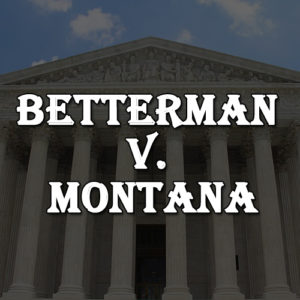Supreme Court Clarifies Speedy Trial Clause in Betterman v. Montana

In Betterman v. Montana, 578 U. S. ____ (2016), the U.S. Supreme Court clarified that the Sixth Amendment’s speedy trial guarantee does not apply once a defendant has been found guilty at trial or has pleaded guilty to criminal charges. The Court’s decision was unanimous.
The Speedy Trial Clause
The Speedy Trial Clause of the Sixth Amendment to the United States Constitution provides that “[i]n all criminal prosecutions, the accused shall enjoy the right to a speedy trial.” The Clause is intended to protect defendants from delay between being arrested and the beginning of trial. The remedy for violation of the Speedy Trial Clause is dismissal with prejudice.
The Facts of the Case
Brandon Betterman pleaded guilty to bail jumping after failing to appear in court on domestic assault charges. He was then jailed for over 14 months awaiting sentence, in large part due to institutional delay. He was eventually sentenced to seven years’ imprisonment, with four of the years suspended. Arguing that the 14-month gap between conviction and sentencing violated his speedy trial right, Betterman appealed. However, the Montana Supreme Court affirmed the conviction and sentence. It ruled that the Sixth Amendment’s Speedy Trial Clause does not apply to postconviction, presentencing delay.
The Court’s Decision
The Supreme Court agreed. It held that the Sixth Amendment’s Speedy Trial guarantee “protects the accused from arrest or indictment through trial, but does not apply once a defendant has been found guilty at trial or has pleaded guilty to criminal charges.” Justice Ruth Bader Ginsburg authored the Court’s opinion.
“As a measure protecting the presumptively innocent, the speedy trial right — like other similarly aimed measures — loses force upon conviction,” Justice Ginsburg wrote. In reaching its decision, the Court further emphasized that “the sole remedy for a violation of the speedy trial right” is dismissal of the charges with prejudice, which “would be an unjustified windfall, in most cases, to remedy sentencing delay by vacating validly obtained convictions.”
The Court acknowledged Betterman’s argument that sentencing hearings have largely replaced the trial as the forum for dispute resolution, given that many cases are resolved via plea bargain. “The modern reality, however, does not bear on the presumption-of-innocence protection at the heart of the Speedy Trial Clause,” Justice Ginsburg wrote. “And factual disputes, if any there be, at sentencing, do not go to the question of guilt; they are geared, instead, to ascertaining the proper sentence within boundaries set by statutory minimums and maximums.”
Finally, the Court noted that while the Speedy Trial Clause may not apply, defendants may have other recourse, such as relief under the Due Process Clauses of the Fifth and Fourteenth Amendments. While Justice Sonia Sotomayor outlined a framework for analyzing post-conviction delay claims under the Due Process Clause in her concurrence, Justice Clarence Thomas, joined by Justice Samuel A. Alito Jr., argued it was an issue for another day.
“We have never decided whether the Due Process Clause creates an entitlement to a reasonably prompt sentencing hearing,” Justice Thomas wrote. “Today’s opinion leaves us free to decide the proper analytical framework to analyze such claims if and when the issue is properly before us.”
Previous Articles
SCOTUS Rules State Can’t Immunize Parties from Federal Civil Liability
by DONALD SCARINCI on January 29, 2026
In John Doe v. Dynamic Physical Therapy, LLC, 607 U.S. ____ (2025) the U.S. Supreme Court held that...
Supreme Court to Address Racial Discrimination in Jury Selection
by DONALD SCARINCI onWhile the U.S. Supreme Court has concluded oral arguments for the year, it continues to add cases t...
Supreme Court Halts Deployment of National Guard to Chicago
by DONALD SCARINCI on
In Trump v. Illinois, 607 U.S. ____ (2025), the U.S. Supreme Court refused to stay a district court...
The Amendments
-
Amendment1
- Establishment ClauseFree Exercise Clause
- Freedom of Speech
- Freedoms of Press
- Freedom of Assembly, and Petitition
-
Amendment2
- The Right to Bear Arms
-
Amendment4
- Unreasonable Searches and Seizures
-
Amendment5
- Due Process
- Eminent Domain
- Rights of Criminal Defendants
Preamble to the Bill of Rights
Congress of the United States begun and held at the City of New-York, on Wednesday the fourth of March, one thousand seven hundred and eighty nine.
THE Conventions of a number of the States, having at the time of their adopting the Constitution, expressed a desire, in order to prevent misconstruction or abuse of its powers, that further declaratory and restrictive clauses should be added: And as extending the ground of public confidence in the Government, will best ensure the beneficent ends of its institution.





